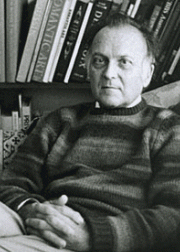
“Life shakes like a drum and would discover resonances of what it loves in its own beat, the old man wetting and heating the head of the drum until it answerd the tone he sought that sought him.”
—Robert Duncan, “Reflections,” Bending the Bow
I’m re-reading all of Duncan’s poetry in my library to prepare for reading The H.D. Book, which just arrived in the mail. But I couldn’t resist reading Michael Boughn‘s and Victor Coleman‘s Introduction, where I found this choice passage:
“What is hidden is constantly brought into the light of the language of the poet, a frail light, finite, playing over the face of what is hidden, bringing it to attention. That is, after all, the poet’s craft—to bring what is hidden to our attention while honoring its hiddenness.”
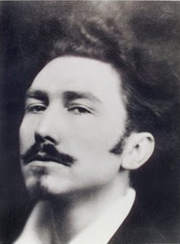 This certainly nutshells Duncan’s approach, though I wonder if it it’s true for everyone. Maybe it’s that last phrase, “while honoring its hiddeness,” that perplexes me. I’m not sure what it means. Read (what I would call) negatively, it implies that poetry maintains certain secrets. Duncan’s certainly does; his poems quote and allude to all manner of arcane sources, especially throughout his “Passages” sequence (the exception, oddly enough, being his citation of Whitman as the source for a bit of prose in “Passages 13: The Fire”). I never know how to receive such “hiddenness” as a reader. It’s as if I’m being asked to say the secret woyd (to quote Groucho Marx), or offer the Masonic handshake, in order to be admitted into the poem. My gut reaction is “screw you!” “Shove your snippets of untranslated Greek!” Etc. A very blue-collar attitude, I’m sure. To be fair to myself, though, I eked my way through The Cantos with Terrell’s Companion at my elbow, and to be honest the exercise only made me appreciate just how depressing a wreck Pound’s “epic” is.
This certainly nutshells Duncan’s approach, though I wonder if it it’s true for everyone. Maybe it’s that last phrase, “while honoring its hiddeness,” that perplexes me. I’m not sure what it means. Read (what I would call) negatively, it implies that poetry maintains certain secrets. Duncan’s certainly does; his poems quote and allude to all manner of arcane sources, especially throughout his “Passages” sequence (the exception, oddly enough, being his citation of Whitman as the source for a bit of prose in “Passages 13: The Fire”). I never know how to receive such “hiddenness” as a reader. It’s as if I’m being asked to say the secret woyd (to quote Groucho Marx), or offer the Masonic handshake, in order to be admitted into the poem. My gut reaction is “screw you!” “Shove your snippets of untranslated Greek!” Etc. A very blue-collar attitude, I’m sure. To be fair to myself, though, I eked my way through The Cantos with Terrell’s Companion at my elbow, and to be honest the exercise only made me appreciate just how depressing a wreck Pound’s “epic” is.
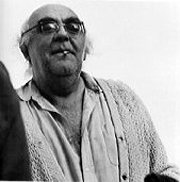 But Duncan is a different kettle of fish. He comes by his taste for the esoteric naturally; it doesn’t seem an egoistic exercise, as it does with Pound—so concerned with being an initiate, so self-satisfied with being one of the Elect. Duncan seems to view his work very differently—as an imaginative exploration of psycho-social realities rather than a zealous propagation of fusty doctrine. Instead of cooking up utopian monetary schemes, Duncan spends his time “searching out the poetic lore of what America is” [“A Lammas Tiding,” again from Bending the Bow].His sympathies are with the living, not the dead, and he strikes me as considerably more innovative than his mentor Olson.
But Duncan is a different kettle of fish. He comes by his taste for the esoteric naturally; it doesn’t seem an egoistic exercise, as it does with Pound—so concerned with being an initiate, so self-satisfied with being one of the Elect. Duncan seems to view his work very differently—as an imaginative exploration of psycho-social realities rather than a zealous propagation of fusty doctrine. Instead of cooking up utopian monetary schemes, Duncan spends his time “searching out the poetic lore of what America is” [“A Lammas Tiding,” again from Bending the Bow].His sympathies are with the living, not the dead, and he strikes me as considerably more innovative than his mentor Olson.
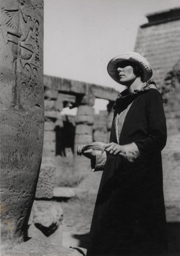 |
| H.D. in Egypt |
In any case, revisiting Duncan is a privilege for me. I’m in a better position to appreciate him now than I was at age 22! And I expect his book on H.D. to cleanse my doors of perception even further, so that maybe I’ll something more in her work than I’ve seen in the past.

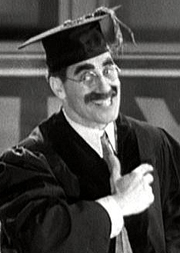
 Joseph Hutchison, Colorado Poet Laureate 2014-2019, has published 20 collections of poems and edited or co-edited three poetry anthologies. He currently directs two master’s-level programs for University College at the University of Denver: Professional Creative Writing and Arts & Culture Management. Joe lives with his wife, Melody Madonna, in the mountains southwest of Denver, Colorado, the city where he was born.
Joseph Hutchison, Colorado Poet Laureate 2014-2019, has published 20 collections of poems and edited or co-edited three poetry anthologies. He currently directs two master’s-level programs for University College at the University of Denver: Professional Creative Writing and Arts & Culture Management. Joe lives with his wife, Melody Madonna, in the mountains southwest of Denver, Colorado, the city where he was born. 










pee-pee est<br /><br />Hey JAWL<br /><br />mentioned my Hopkins' friend, Jeff Lohn<br /><br />well for one of my requirements in The Seminars I had to give a lecture/presentation<br />so I played that entire 5 hour Olson tape the Berkeley thing and the one the day before where Duncan introduces Olson<br /><br />Jeff got into it went over to the piano and started playing some Bach most
just looking through my Cage "stash"<br />and found that note that John Cage wrote his address on<br /><br />"from the desk of <br /><br /> johanna Ribbelink"<br /><br />I didn't recal name of Cage's music publisher..<br /><br />so I googled "johanna Ribbelink"<br />turns out she was C.F. Peters" (the publisher)'s<br /
It's a <br />rather<br />long story<br />on one of my visits (1971) up to "hang-out" with my Main Muse 1971 NYC working on several "runs" of poetry while 'vacationing" at/in Johns Hopkins'<br />Writing Seminars program<br />I via Jeff Lohn discovered John Cage so<br />was working on Okenos Rhoos: a fugato for reader<br />well I saw that JC 's music
It's a <br />rather<br />long story<br /><br />on one of my visits (1971) up to "hang-out" with my Main Muse 1971 NYC working on several "runs" of poetry while 'vacationing" at/in Johns Hopkins'<br />Writing Seminars program<br /><br />I via Jeff Lohn discovered John Cage so<br />was working on Okenos Rhoos: a fugato for reade<br /><br />and<br />well
I'm under the weather, folks, so I won't respond in detail. Thanks to all for the great comments, referrals, etc.<br /><br />And Ed—re: what Duncan said to you. <i>Do tell…</i>
picked up a cpl years ago speaking of The Cantos & now Charles Olson<br /><br />FOR A $!.99 x-library (SUNY At Buffalo hard-bound copy of <br /> Charles Olson & Ezra Pound<br /> An Encountwer at St. Elizabeths <br /><br />by Charles Olson via editor Seelye of CO's<br />record of these visits (1945) in notes, diaries, poems.<br /><br />check
Joe, everyone, <br /><br />Also check out Michael Boughn's Three Lectures, recently released by Shuffaloff Books. Clear, enlightening, brave on the critique of some things of the poetry moment. Must read for anyone interested in the "Olson tradition."<br /><br />Kent
I too tried but never did get through The Cantos<br /><br />bout all I could "handle" was The Pisan Cantos<br /> barely..<br />both Duncan and Olson here (in D.C.) muchly visiting Pound at St. Elizabeth's <br /><br />one day I will tell UHAUL of my oneandonly meeting with/of Robert Duncan & what he said to me….
"To be fair to myself, though, I eked my way through The Cantos with Terrell's Companion at my elbow, and to be honest the exercise only made me appreciate just how depressing a wreck Pound's "epic" is."<br /><br />Bravo!<br /><br />I've gotten only through the "The Cantos" "required reading" bits without taking the trouble (as you have) to